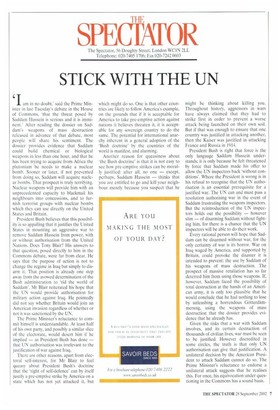STICK WITH THE UN
Iam in no doubt,' said the Prime Minister in last Tuesday's debate in the House of Commons, that the threat posed by Saddam Hussein is serious and it is imminent.' After reading the dossier on Saddam's weapons of mass destruction released in advance of that debate, most people will share his sentiment. The dossier provides evidence that Saddam could build chemical or biological weapons in less than one hour, and that he has been trying to acquire from Africa the plutonium he needs to make a nuclear bomb. Sooner or later, if not prevented from doing so, Saddam will acquire nuclear bombs. That prospect is truly terrifying. Nuclear weapons will provide him with an unprecedented capacity to blackmail his neighbours into concessions, and to furnish terrorist groups with nuclear bombs which they can use directly on the United States and Britain.
President Bush believes that this possibility is so appalling that it justifies the United States in mounting an aggressive war to remove Saddam Hussein from power, with or without authorisation from the United Nations, Does Tony Blair? His answers to that question, posed directly to him in the Commons debate, were far from clear. He says that the purpose of action is not to change the regime in Iraq but simply to disarm it. That position is already one step away from the avowed determination of the Bush administration to 'rid the world of Saddam'. Mr Blair reiterated his hope that the UN would provide authorisation for military action against Iraq. He pointedly did not say whether Britain would join an American invasion regardless of whether or not it was sanctioned by the UN.
The Prime Minister's reluctance to commit himself is understandable. At least half of his own party, and possibly a similar slice of the electorate, would desert him if he implied — as President Bush has done — that UN authorisation was irrelevant to the justification of war against Iraq.
There are other reasons, apart from electoral self-interest, for Mr Blair to feel queasy about President Bush's doctrine that the 'right of self-defence' can by itself justify a pre-emptive strike by America on a state which has not yet attacked it, but which might do so. One is that other countries are likely to follow America's example, on the grounds that if it is acceptable for America to take pre-emptive action against nations it believes threaten it, it is acceptable for any sovereign country to do the same. The potential for international anarchy inherent in a general adoption of the 'Bush doctrine' by the countries of the world is manifest, and alarming.
Another reason for queasiness about 'the Bush doctrine' is that it is not easy to see how pre-emptive strikes can be morally justified: after all, no one — except, perhaps, Saddam Hussein — thinks that you are entitled to go and kill your neighbour merely because you suspect that he might be thinking about killing you. Throughout history, aggressors in wars have always claimed that they had to strike first in order to prevent a worse attack being launched on their own soil. But if that was enough to ensure that one country was justified in attacking another, then the Kaiser was justified in attacking France and Russia in 1914.
President Bush is right that force is the only language Saddam Hussein understands; it is only because he felt threatened by force that Saddam made his offer to allow the UN inspectors back 'without conditions'. Where the President is wrong is in his refusal to recognise that the UN authorisation is an essential prerequisite for a justified war. The UN can and must pass a resolution authorising war in the event of Saddam frustrating the weapons inspectors. But the reintroduction of the UN inspectors holds out the possibility — however slim — of disarming Saddam without fighting him, for there is a chance that the UN inspectors will be able to do their work.
Every rational person will hope that Saddam can be disarmed without war, for the only certainty of war is its horror. War on Iraq waged by America, and supported by Britain, could provoke the disaster it is intended to prevent: the use by Saddam of his weapons of mass destruction. The prospect of massive retaliation has so far deterred him from using those weapons. If, however, Saddam faced the possibility of total destruction at the hands of an American army, it is only too plausible that he would conclude that he had nothing to lose by unleashing a horrendous GOtterdammerung, using the weapons of mass destruction that the dossier provides evidence that he already has.
Given the risks that a war with Saddam involves, and its certain destruction of thousands of civilian lives, war must be seen to be justified. However discredited in some circles, the truth is that only UN authorisation can give that justification. A unilateral decision by the American President to attack Saddam cannot do so. The Prime Minister's reluctance to endorse a unilateral attack suggests that he realises this. For once, his equivocation under questioning in the Commons has a sound basis.


































































































 Previous page
Previous page